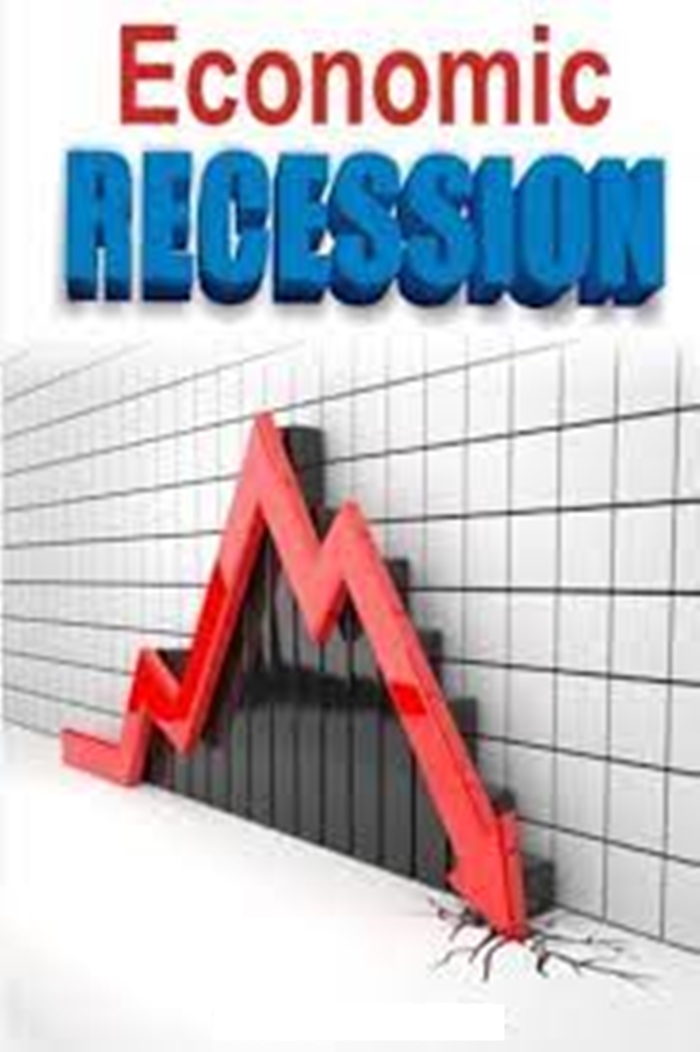In this article, we discussed the effect of recession on Nigeria economy, we also talked about the meaning of recession, economy and the causes.
Definition
Recession is a period when the economy of a country is not successful and conditions for business are bad
A recession can be defined as a sustained period of weak or negative growth in real GDP (output) that is accompanied by an important rise in the unemployment rate. Many other indicators of economic activity are also weak during a recession. For instance, levels of household spending and investment by businesses are usually low. In addition, the numbers of households and businesses that are unable to pay back loans are unusually high, as is the number of businesses that close down. Because these indicators are typically present when there is a significant increase in the unemployment rate, the unemployment rate is considered a reliable and timely immediate indicator of a range of negative developments in an economy.
An economy is an area of the production, distribution and trade, as well as consumption of goods and services.
Economic recession is a period of general economic decline and is typically accompanied by a drop in the stock market, an increase in unemployment, and a decline in the housing market. Generally, a recession is less severe than a depression.
The Effect of Recession on Nigeria Economy and Way Out
The economic recession has serious negative impacts on government revenue, employment, income vulnerability, inflation, human health, infrastructural supply, poverty and natural resource management in Nigeria.
Effective Spending
Mere increase in government spending will not solve the problem of recession. It is strategic spending in areas with high multiplier effect such as aggregate demand. Nigeria needs expand her export earnings and production through wise investment. Otherwise, might likely end in a classical maltusian situation where the resources cannot support the population. Inoculating more funds into the economy is not bad, but there is need for change, allowing free flow of naira and alleviating the oil sector, updating agricultural sector. By this, Nigeria can spend her way out of recession wisely.
Enhanced Access to Credit
Here, the Nigerian government especially the federal and the state government should grant soft loan for small and medium scale enterprises, to enable them boost gross domestic product (GDP) of the country. In the same vein, agricultural credit should also be given to farmers to enhance adequate food production and reduce the bike of farm produce in the country (Nigeria).
Nigerian Government Should Increase Her Expenditure on Skills
This is one point that most African countries had always neglected. It is only skills that lead to production. People are looking for problem solver. So, government should invest in skills acquisition in IT, telecommunication, agroallied, sports among others. The training should be 80% free practical. There is need for multiple competence, particularly among youths as a measure to restriction increase global joblessness. The greatest challenge today in Nigeria is unemployment. The government should partner with private organizations, to organize entrepreneurship and skills acquisition programs for the youths. There should be high level of transparency in the program to ensure the best candidates are picked. This way, Nigeria will soon see herself on top of the Fastest growing economy in Africa.
Increase Agricultural Produce and Exports
In the 1960s, agriculture was the main base of Nigeria, in terms of GDP, foreign exchange earnings, and employment. Today, Nigeria spends about 10 billion US dollars a year on the importation of agricultural products. Nigerian government should stop talking and start working. Enough of talk, people want to see actions. The youths as earlier stated, should be encouraged to go into farming. They should be trained free on various agricultural sectors.
THE CAUSES OF RECESSION
The following are the major causes of recession in any given economy as drawn from the great lesson of depression 1981, 1991, 2004, 2008-2009 global economic recessions. They including:
High inflation, a general rise in price of goods and service which leads to low purchasing power
Accumulation of debt servicing especially foreign debts.
High- interest rate –discouraging investors
Fall in aggregate demand, fall in wages and income.
Mass unemployment
General loss of confidence on the government due economic indices.
High Taxation It is only in Nigeria that I see government charging high tax rate during economic recession. Small business is slaughtered with high interest rate. But high interest and tax rate has lowered Nigeria aggregate demand.
Policy Conflict The economic policies appear conflicting. How? High interest rate, high tax rate are tight monetary measures. But the government told the public it is adopting expansionary policy-budget deficit.
Poor economic planning: Poor economic planning and implementation of her economic planning is the major cause of Nigeria current recession – budget delay, exchange rate policy. The government has announced the usual overviews that every government indulges itself in.
CONCLUSION
With more people out of work, and families increasingly unable to make ends meet, the pressure on demands for government-funded. Nigerian government should stop talking and start working, the youth should be trained free on various agricultural sectors. They should be general low increase in price of goods and services which can lead to high purchasing power.


